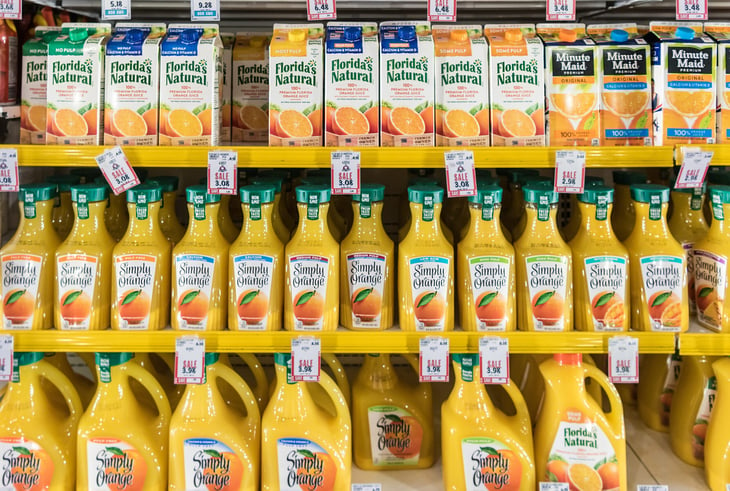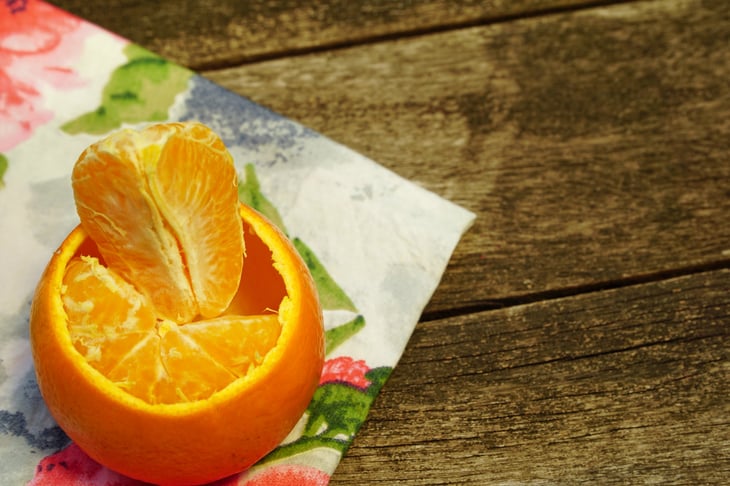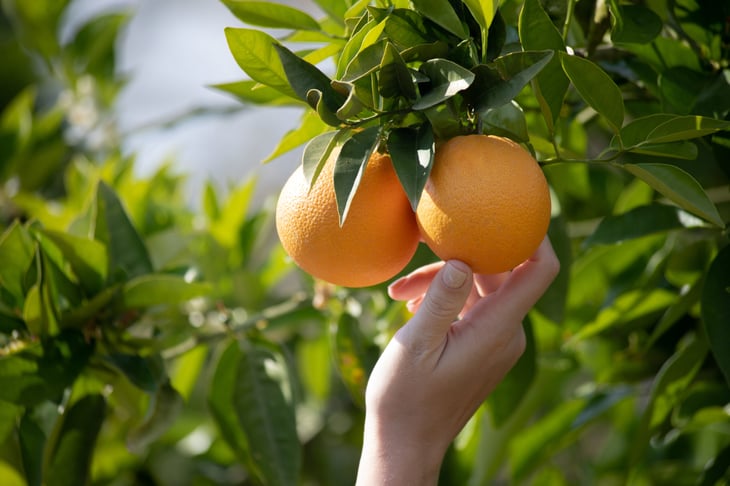
Do you regularly wash down your breakfast or swallow supplements with a tall glass of orange juice? It’s time to rethink your drink selection. With citrus greening disease threatening trees and stifling production in Florida and Brazil this season, your beloved orange juice could get more expensive.
Some might say this is Mother Nature’s way of telling you to cut back on how much OJ you drink. Or, better yet, quit the sweet stuff for good. But if you don’t want to read the signs, at least read the research. There are several compelling, evidence-based reasons to kick your daily OJ habit.
In addition to saving money, you’ll be saving your health in more ways than one.
1. Orange juice might be contaminated with ‘forever chemicals’

“Forever chemicals” are more officially known as per- and polyfluoroalkyl substances (PFAS). These manmade chemicals all have a type of carbon-fluorine bond so strong that it is believed it will never break down naturally. This is a great feature when you’re trying to create products that are resistant to heat, water, oil and corrosion and why PFAS are commonly found in food packaging.
The downside is PFAS exposure has been associated with a number of health concerns. Consumer Reports highlights some of the dangers of PFAS, including immune system disorders, low birth weight and an increased risk of cancer. These “forever chemicals” cause harm by leaching into the food and water supply. In fact, The Guardian reports that Coca-Cola’s Simply Tropical fruit juice contains toxic levels of PFAS.
Take note: packaging that holds fatty, salty or acidic foods – like orange juice – are exceptional offenders of PFAS exposure. So, unless your OJ comes in a glass bottle, you may be getting a dose of “forever chemicals” with your morning meal.
2. Orange juice is bad for your teeth

If you’ve ever brushed your teeth right after drinking a glass of orange juice, you know the two don’t mix well. But that bitter taste is not the only bad thing OJ will leave in your mouth. Experts say excessive consumption of natural fruit juices and acidic foods and beverages is associated with tooth erosion. In fact, researchers determined the acid in orange juice may have harsher effects on tooth enamel than professional teeth-whitening products.
3. Orange juice might negatively interact with medications

Phytochemicals found in fruit juice can alter the effect of certain medications by either prohibiting their impact or enhancing the drug’s power, both of which can lead to serious complications. Different drugs interact with different types of fruit juice.
However, research shows that orange juice can “decrease oral absorption” of osteoporosis medications. Of course, this is just one example. Always ask your doctor about food-drug interactions before starting any new medication.
4. Regular OJ consumption can increase your risk of cardio-metabolic disorders

You probably already know orange juice is a concentrated source of carbohydrates, namely in the form of sugar. However, it’s not just the total sugar content that’s concerning but also the type of sugar.
An NPR article points out that store-bought orange juice contains about 28 grams of fructose per liter. Why does that matter? Fructose is a form of sugar that gets processed almost entirely by the liver, where it can easily be converted into fat, leading to weight gain and other health issues.
These concerns are illustrated more clearly in a research study published in The American Journal of Clinical Nutrition. In the study, those who consumed fructose from sugar-sweetened beverages and fruit juice had higher blood lipid profiles than those consuming the natural sugar in fresh fruit. Historically, poor lipid profiles can indicate an increased risk of heart attack, stroke, obesity and type 2 diabetes.
5. Orange juice is less nutritious than a fresh orange

For decades, researchers have evaluated the benefits of fresh fruit compared with fruit juice. Many studies, including the one from the American Journal of Clinical Nutrition and another from the British Medical Journal (BMJ), recommend swapping fruit juice for fresh, whole fruit. The BMJ study of more than 100,000 people found that eating more whole fruits was associated with a lower risk of developing type 2 diabetes, while drinking more fruit juice was associated with a higher risk of type 2 diabetes.
Plus, experts from the Centers for Disease Control and Prevention note that a fresh orange provides more fiber and fewer calories than the juiced version. That makes it beneficial for weight management. Not to mention, eating a fresh orange ignites all five senses, which creates an all-around more satisfying eating experience.
6. Orange juice requires a lot of oranges

The facts aren’t always easy to swallow, but you may feel morally obligated to stop drinking orange juice once you read this: It takes two to four oranges to make one 8-ounce glass of OJ. If you happen to have a box full of oranges from your CSA (Community Supported Agriculture) program, juicing those goodies for brunch is not a bad idea. Otherwise, get your vitamin C from a fresh, whole orange to reduce strain on the food system.





Add a Comment
Our Policy: We welcome relevant and respectful comments in order to foster healthy and informative discussions. All other comments may be removed. Comments with links are automatically held for moderation.